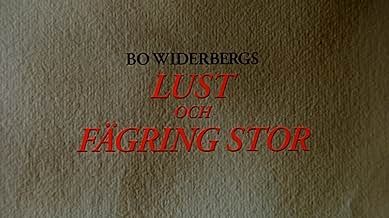A Malmö en Suède pendant la Seconde Guerre mondiale, Stig est un élève de 15 ans et Viola, son professeur, a 37 ans. Tous deux attirés par ce qui les opposent, ils entament une relation pass... Tout lireA Malmö en Suède pendant la Seconde Guerre mondiale, Stig est un élève de 15 ans et Viola, son professeur, a 37 ans. Tous deux attirés par ce qui les opposent, ils entament une relation passionnée et interdite.A Malmö en Suède pendant la Seconde Guerre mondiale, Stig est un élève de 15 ans et Viola, son professeur, a 37 ans. Tous deux attirés par ce qui les opposent, ils entament une relation passionnée et interdite.
- Réalisation
- Scénario
- Casting principal
- Nommé pour 1 Oscar
- 6 victoires et 7 nominations au total
Avis à la une
This is the life most men wish they had - an affair with their teacher. But all were not so pretty as the one in here. It's a coming of age story set in a time when men were going off to die in wars and those left behind were trying to make sense of it all in a society that was slowly crumbling. More complicated than now but still relevant in today's youth. All handled brilliantly by the Swedish director, Bo Widerberg, who loves to tell his tales in sensual lighting and locations. He sometimes tends to go soapy but held it in line for hi last work of art. Hewas to pass away a couple of years later. But he left us with another tender story for the soul.
When reading the synopsis, Bo Widerberg's film evokes understandable skepticism, but as soon as the final credits appear on the screen, and you remember everything that you literally experienced in these 2-and-a-half hours with the hero, it becomes clear that this is not an ordinary drama about romance between a student and a teacher.
The Swedish city of Malmo, at the height of World War II. The pretty middle-aged teacher Viola gets a job at the school where the main character, 15-year-old Stig, studies. These two character decide to get closer with each other, mostly due to the teacher's advances.
Of course, such a relationship is doomed from the very beginning: it goes against morality, against society. However, the actors are providing a very believable and masterful performance.
The biggest advantages of the film are in the acting, Vinderberg Jr. Is very handsome and charismatic. The film's musical accompaniment and script are also okay. I was glad to spend my time watching this film, and I remain very pleased and impressed.
The Swedish city of Malmo, at the height of World War II. The pretty middle-aged teacher Viola gets a job at the school where the main character, 15-year-old Stig, studies. These two character decide to get closer with each other, mostly due to the teacher's advances.
Of course, such a relationship is doomed from the very beginning: it goes against morality, against society. However, the actors are providing a very believable and masterful performance.
The biggest advantages of the film are in the acting, Vinderberg Jr. Is very handsome and charismatic. The film's musical accompaniment and script are also okay. I was glad to spend my time watching this film, and I remain very pleased and impressed.
How much I regret the passing of director Bo Widerberg who can create a film such as this one with its dramatic portrayal of human problems, human relationships and human emotions. It was not so much the dialogue but more the unspoken words that grabbed my attention and held me to the end. A long silence can be filled with meaning....a stolen look, a fleeting glance, a flicker of a smile, a movement of the eye....all these subtle messages electrify the air between Viola the teacher and Stig the student in the class room. We know at once that in some magical way their lives have been drawn together and as we are caught up in the drama we seem to know that eventually the ending will not be a happy one.
Under the guise of having special coaching lessons, Stig gains entrance into his married teacher's household after his evening cinema job. Shy at first he soon experiences the delights of a continuing relationship with Viola who is a very competent teacher in all respects. Perhaps we can pardon Viola for her "cradle snatching" when we find out that her husband has taken to drink and seems almost permanently drunk.
The love scenes are sensitively handled and the remarkable changes which develop in the characters create an imposing piece of cinema. Stig seems to take on a degree of security in a scene where he accuses the husband of the impossible situation. But who is really to blame? That is the intriguing part of the film.
There are some aspects that are not explained thus the viewer becomes involved. As for the stolen encyclopaedia, why would Stig carry them off. Is he just in a vindictive mood and does it just to annoy Viola or have those volumes become special to him because they belonged to Viola.
Under the guise of having special coaching lessons, Stig gains entrance into his married teacher's household after his evening cinema job. Shy at first he soon experiences the delights of a continuing relationship with Viola who is a very competent teacher in all respects. Perhaps we can pardon Viola for her "cradle snatching" when we find out that her husband has taken to drink and seems almost permanently drunk.
The love scenes are sensitively handled and the remarkable changes which develop in the characters create an imposing piece of cinema. Stig seems to take on a degree of security in a scene where he accuses the husband of the impossible situation. But who is really to blame? That is the intriguing part of the film.
There are some aspects that are not explained thus the viewer becomes involved. As for the stolen encyclopaedia, why would Stig carry them off. Is he just in a vindictive mood and does it just to annoy Viola or have those volumes become special to him because they belonged to Viola.
Bo Widerberg was honored in February 1997 at the Miami Film Festival with a retrospective (ELVIRA MADIGAN), and his latest (last?) film, the Oscar nominated ALL THINGS FAIR. I then saw ALL THINGS FAIR for the second time, and despite its length, enjoyed it as much or more than the first time I saw it in an arthouse theatre in Toronto. I think ALL THINGS FAIR is the great Swedish director's best, most personal film. You can't help but notice it must be autobiographical by the passion and the vivid recreation of WW II Sweden, as it was when Mr. Wideberg himself was the lead character's age. Speaking of him, the lead is the director's own 17 year old son, Johan Widerberg, who will undoubtedly carry on the family tradition in Swedish cinema history. Mr. Widerberg (Sr.) passed away last year, and among his legacy, this film stands out. It is a rare coming of age story in a setting seldom depicted on screen. Mr. Wideberg's screenplay, and direction, plus excellent performances by his son and two of Sweden's greats, Marika Lagerkrantz and Tomas van Bromssen make this a movie every European film buff should watch. It's now available on video. Check it out.
"All Things Fair" is a strange kind of film because it is always transforming itself. While it always remains a coming-of-age film it ranges in its focus, touching on many different expressions. Obviously this makes it hard to categorise, hard to follow, hard to analyse, and all this seems to add up to a good thing. It starts out so luridly that I thought I was in for a Swedish version of "Private Lessons" but somehow it manages to continually evolve into something quite else. The changes in pace and locus give the narrative a certain elliptical feel which consolidate the nostalgic representation. Pretty good performances all round and some unexpected twists in the tale make it well worthwhile.
Le saviez-vous
- AnecdotesKarin Huldt was 14 during filming.
- GaffesRCA Red Seal records are shown playing on the phonograph nearly every time Stig and Kjell are listening to classical music, and when Stig is listening to a classical recording at his home; none of the pieces on the soundtrack were RCA recordings.
- ConnexionsFeatured in Lust och fägring - En film om Bo Widerbergs sista (2015)
- Bandes originalesRinaldo: Lascia ch'io pianga
Music by George Frideric Handel (as Händel)
Performed by Lesley Garrett with The Philharmonia Orchestra
Conducted by Ivor Bolton
Silva Screen Records (UK)
Meilleurs choix
Connectez-vous pour évaluer et suivre la liste de favoris afin de recevoir des recommandations personnalisées
- How long is All Things Fair?Alimenté par Alexa
Détails
- Date de sortie
- Pays d’origine
- Langues
- Aussi connu sous le nom de
- La belleza de las cosas
- Lieux de tournage
- Sociétés de production
- Voir plus de crédits d'entreprise sur IMDbPro
Box-office
- Budget
- 25 000 000 DKK (estimé)
- Montant brut aux États-Unis et au Canada
- 13 128 $US
- Week-end de sortie aux États-Unis et au Canada
- 4 530 $US
- 10 mars 1996
- Montant brut mondial
- 13 128 $US
Contribuer à cette page
Suggérer une modification ou ajouter du contenu manquant

Lacune principale
What was the official certification given to La beauté des choses (1995) in Brazil?
Répondre























